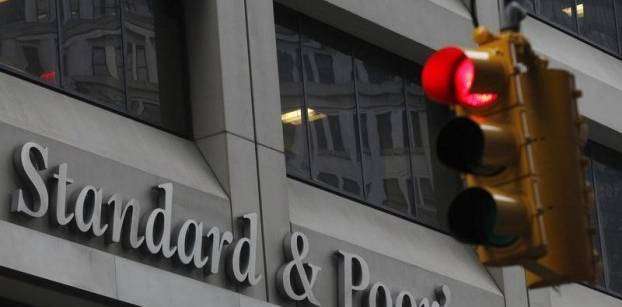Egypt's foreign currency shortage to worsen - Standard and Poor's

Standard and Poor's logo. REUTERS (archive)
CAIRO, May 15 (Aswat Masriya) - Egypt's foreign currency shortage crisis is moving towards further complexity, according to projections made by the credit rating agency Standard and Poor's.
The agency said on Friday that it will reduce Egypt's credit rating from stable to negative, reflecting its pessimistic view about “Egypt’s external and fiscal vulnerabilities.”
The country’s economy “will continue to suffer from foreign exchange shortages and external and fiscal financing pressures,” Standard and Poor’s added.
Having tracked Egypt's foreign liabilities in foreign currencies against its revenues, Standard and Poor's projections saw the country’s net external liabilities increase from 177.9 per cent last November up to 212.8 per cent in the rating agency’s latest report. The projections continue to rise to reach 249.1 per cent in FY 2018-2019.
This index is calculated based on the total financial dues of Egypt’s public and private sectors to foreign entities subtracted from the total foreign assets of Egyptians and compared to the ongoing foreign revenue flowing to Egypt.
The agency believes that despite the continuation of the Gulf’s support to Egypt, the financial pressures will continue. It put the amount of financial aid given to Egypt by Saudi Arabia, the United Arab Emirates and Kuwait in the past four years at about $25 billion.
The three Gulf countries have strongly supported Egypt in the wake of the military ouster of former president Mohamed Mursi of the Muslim Brotherhood in July 2013, which followed mass protests against his rule. But the pace of the aid has been declining gradually.
The most recent figure announced by the UAE late last month was $4 billion, distributed equally between deposits and investments. The agency expects Egypt to receive a $2 billion deposit from the UAE before the end of June 2016.
Standard and Poor’s described Egypt’s fiscal deficit during the fiscal year 2014-2015, which reached 11.5 per cent of the GDP, as one of the highest among the countries that the agency rates at “B-“.
The agency expects a slight decline in the trade balance during the current fiscal year to 11 per cent of the GDP, down from 11.5. The report points out that the sociopolitical environement inside the country may be an obstacle to the government's ability to control the high shortages.
“Overall, we expect budgetary consolidation to continue at a slower pace than we had anticipated, in light of Egypt's social fragility,” the rating agency added in its report.
The agency considers the political, social and security environment in Egypt as still "fragile”, referring in this regard to the recent decision to transfer control over two Red Sea islands to Saudi Arabia, as well as the “continued hostile situation” between Egyptian forces in the Sinai and Islamic State militants.
Given the current budget deficit, the government is expected to continue with a number of reform measures, bearing political risks, so as to reduce expenses, according to the agency.
Standard and Poor's estimated Egypt’s public debt to reach 91 per cent of its GDP in the next three years.









facebook comments